Evidence-Based Nursing Care: Informatics, Leadership, and Transition
VerifiedAdded on 2020/06/06
|8
|2186
|72
Report
AI Summary
This report delves into evidence-based nursing care, emphasizing the integration of health informatics, various leadership styles, and the development of essential skills for nurses. The introduction provides an overview of the healthcare sector's focus on improving patient care through efficient practices and the crucial role of nurses in following physicians' directives. The report explores the application of nursing informatics in streamlining medical records, facilitating clinical trials, and reducing errors. It also examines different leadership styles, such as transformational, collaborative, and ethical leadership, and their impact on nursing practice. Furthermore, the report discusses the importance of developing knowledge, a positive attitude, and practical skills to ensure a smooth transition into professional nursing practice. The conclusion highlights the significance of these elements in delivering high-quality patient care and achieving better health outcomes. The report references several books and journals, providing a robust foundation for its analysis and recommendations.
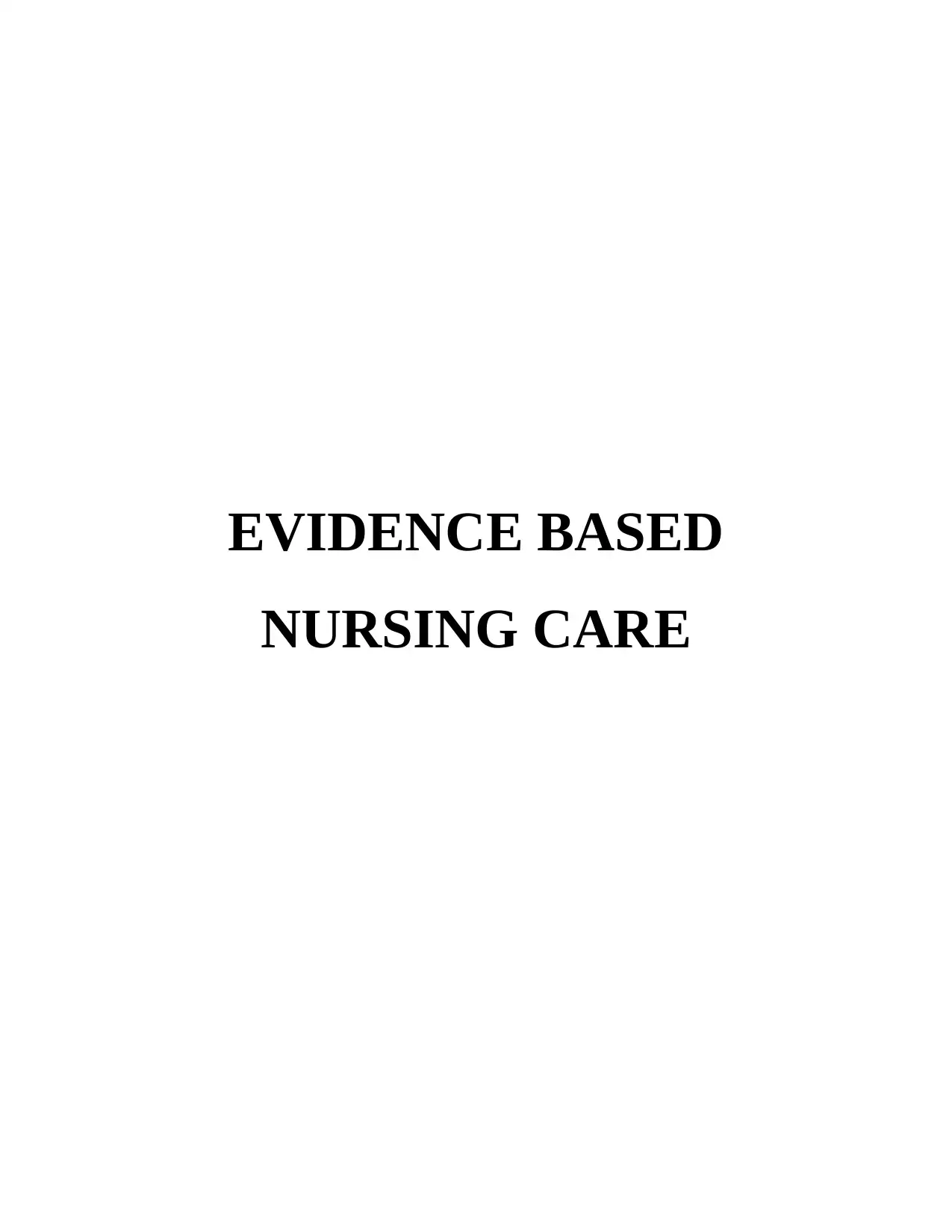
EVIDENCE BASED
NURSING CARE
NURSING CARE
Paraphrase This Document
Need a fresh take? Get an instant paraphrase of this document with our AI Paraphraser
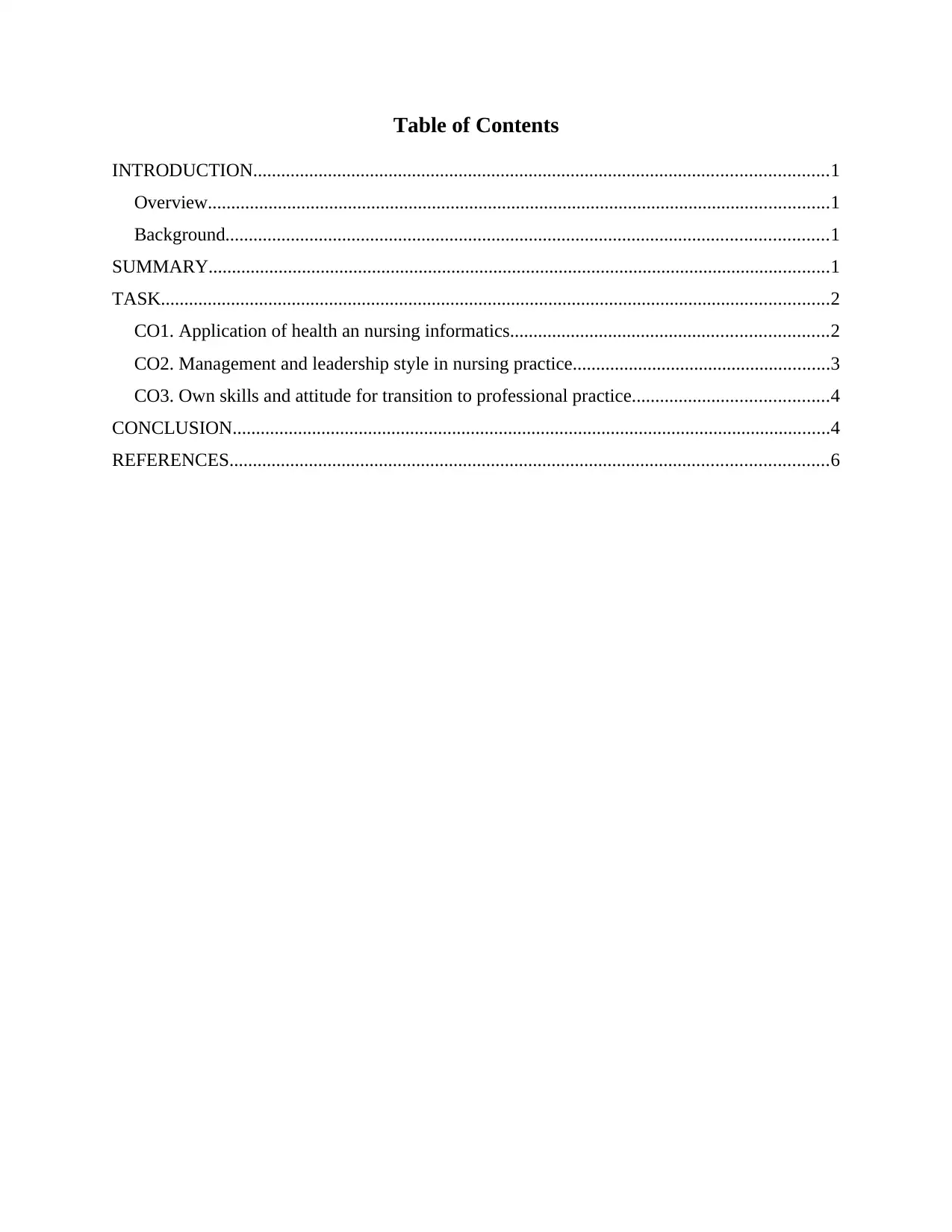
Table of Contents
INTRODUCTION...........................................................................................................................1
Overview.....................................................................................................................................1
Background.................................................................................................................................1
SUMMARY.....................................................................................................................................1
TASK...............................................................................................................................................2
CO1. Application of health an nursing informatics....................................................................2
CO2. Management and leadership style in nursing practice.......................................................3
CO3. Own skills and attitude for transition to professional practice..........................................4
CONCLUSION................................................................................................................................4
REFERENCES................................................................................................................................6
INTRODUCTION...........................................................................................................................1
Overview.....................................................................................................................................1
Background.................................................................................................................................1
SUMMARY.....................................................................................................................................1
TASK...............................................................................................................................................2
CO1. Application of health an nursing informatics....................................................................2
CO2. Management and leadership style in nursing practice.......................................................3
CO3. Own skills and attitude for transition to professional practice..........................................4
CONCLUSION................................................................................................................................4
REFERENCES................................................................................................................................6
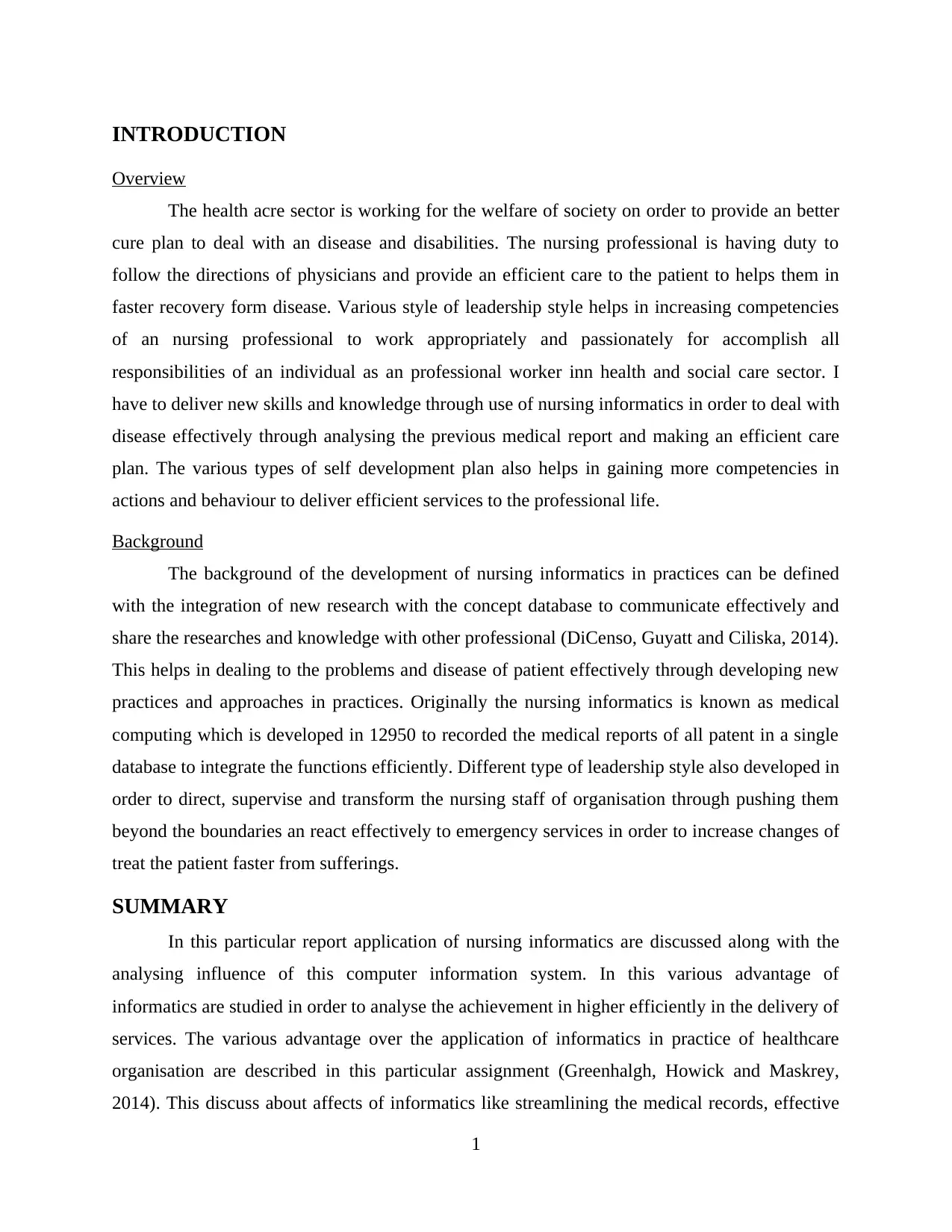
INTRODUCTION
Overview
The health acre sector is working for the welfare of society on order to provide an better
cure plan to deal with an disease and disabilities. The nursing professional is having duty to
follow the directions of physicians and provide an efficient care to the patient to helps them in
faster recovery form disease. Various style of leadership style helps in increasing competencies
of an nursing professional to work appropriately and passionately for accomplish all
responsibilities of an individual as an professional worker inn health and social care sector. I
have to deliver new skills and knowledge through use of nursing informatics in order to deal with
disease effectively through analysing the previous medical report and making an efficient care
plan. The various types of self development plan also helps in gaining more competencies in
actions and behaviour to deliver efficient services to the professional life.
Background
The background of the development of nursing informatics in practices can be defined
with the integration of new research with the concept database to communicate effectively and
share the researches and knowledge with other professional (DiCenso, Guyatt and Ciliska, 2014).
This helps in dealing to the problems and disease of patient effectively through developing new
practices and approaches in practices. Originally the nursing informatics is known as medical
computing which is developed in 12950 to recorded the medical reports of all patent in a single
database to integrate the functions efficiently. Different type of leadership style also developed in
order to direct, supervise and transform the nursing staff of organisation through pushing them
beyond the boundaries an react effectively to emergency services in order to increase changes of
treat the patient faster from sufferings.
SUMMARY
In this particular report application of nursing informatics are discussed along with the
analysing influence of this computer information system. In this various advantage of
informatics are studied in order to analyse the achievement in higher efficiently in the delivery of
services. The various advantage over the application of informatics in practice of healthcare
organisation are described in this particular assignment (Greenhalgh, Howick and Maskrey,
2014). This discuss about affects of informatics like streamlining the medical records, effective
1
Overview
The health acre sector is working for the welfare of society on order to provide an better
cure plan to deal with an disease and disabilities. The nursing professional is having duty to
follow the directions of physicians and provide an efficient care to the patient to helps them in
faster recovery form disease. Various style of leadership style helps in increasing competencies
of an nursing professional to work appropriately and passionately for accomplish all
responsibilities of an individual as an professional worker inn health and social care sector. I
have to deliver new skills and knowledge through use of nursing informatics in order to deal with
disease effectively through analysing the previous medical report and making an efficient care
plan. The various types of self development plan also helps in gaining more competencies in
actions and behaviour to deliver efficient services to the professional life.
Background
The background of the development of nursing informatics in practices can be defined
with the integration of new research with the concept database to communicate effectively and
share the researches and knowledge with other professional (DiCenso, Guyatt and Ciliska, 2014).
This helps in dealing to the problems and disease of patient effectively through developing new
practices and approaches in practices. Originally the nursing informatics is known as medical
computing which is developed in 12950 to recorded the medical reports of all patent in a single
database to integrate the functions efficiently. Different type of leadership style also developed in
order to direct, supervise and transform the nursing staff of organisation through pushing them
beyond the boundaries an react effectively to emergency services in order to increase changes of
treat the patient faster from sufferings.
SUMMARY
In this particular report application of nursing informatics are discussed along with the
analysing influence of this computer information system. In this various advantage of
informatics are studied in order to analyse the achievement in higher efficiently in the delivery of
services. The various advantage over the application of informatics in practice of healthcare
organisation are described in this particular assignment (Greenhalgh, Howick and Maskrey,
2014). This discuss about affects of informatics like streamlining the medical records, effective
1
⊘ This is a preview!⊘
Do you want full access?
Subscribe today to unlock all pages.

Trusted by 1+ million students worldwide
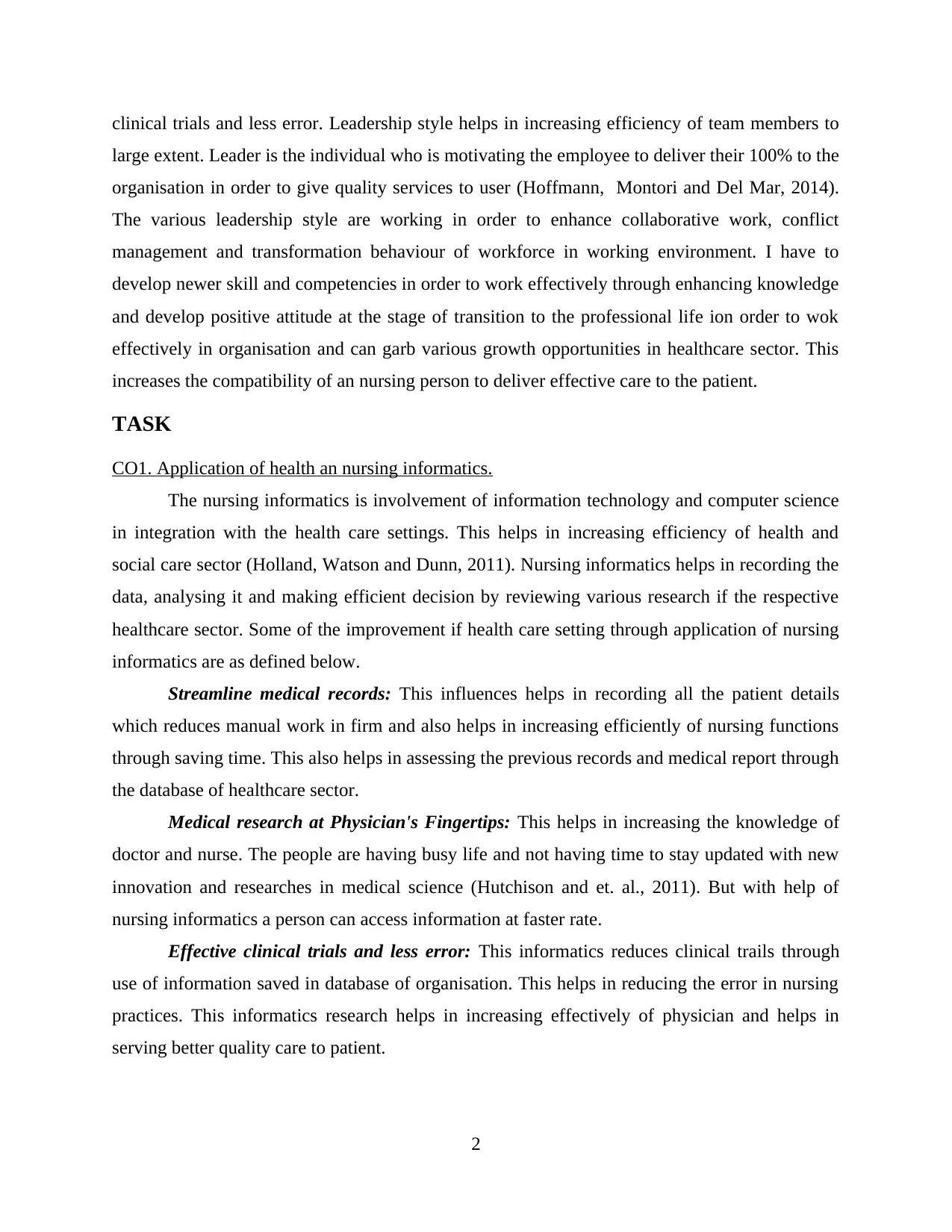
clinical trials and less error. Leadership style helps in increasing efficiency of team members to
large extent. Leader is the individual who is motivating the employee to deliver their 100% to the
organisation in order to give quality services to user (Hoffmann, Montori and Del Mar, 2014).
The various leadership style are working in order to enhance collaborative work, conflict
management and transformation behaviour of workforce in working environment. I have to
develop newer skill and competencies in order to work effectively through enhancing knowledge
and develop positive attitude at the stage of transition to the professional life ion order to wok
effectively in organisation and can garb various growth opportunities in healthcare sector. This
increases the compatibility of an nursing person to deliver effective care to the patient.
TASK
CO1. Application of health an nursing informatics.
The nursing informatics is involvement of information technology and computer science
in integration with the health care settings. This helps in increasing efficiency of health and
social care sector (Holland, Watson and Dunn, 2011). Nursing informatics helps in recording the
data, analysing it and making efficient decision by reviewing various research if the respective
healthcare sector. Some of the improvement if health care setting through application of nursing
informatics are as defined below.
Streamline medical records: This influences helps in recording all the patient details
which reduces manual work in firm and also helps in increasing efficiently of nursing functions
through saving time. This also helps in assessing the previous records and medical report through
the database of healthcare sector.
Medical research at Physician's Fingertips: This helps in increasing the knowledge of
doctor and nurse. The people are having busy life and not having time to stay updated with new
innovation and researches in medical science (Hutchison and et. al., 2011). But with help of
nursing informatics a person can access information at faster rate.
Effective clinical trials and less error: This informatics reduces clinical trails through
use of information saved in database of organisation. This helps in reducing the error in nursing
practices. This informatics research helps in increasing effectively of physician and helps in
serving better quality care to patient.
2
large extent. Leader is the individual who is motivating the employee to deliver their 100% to the
organisation in order to give quality services to user (Hoffmann, Montori and Del Mar, 2014).
The various leadership style are working in order to enhance collaborative work, conflict
management and transformation behaviour of workforce in working environment. I have to
develop newer skill and competencies in order to work effectively through enhancing knowledge
and develop positive attitude at the stage of transition to the professional life ion order to wok
effectively in organisation and can garb various growth opportunities in healthcare sector. This
increases the compatibility of an nursing person to deliver effective care to the patient.
TASK
CO1. Application of health an nursing informatics.
The nursing informatics is involvement of information technology and computer science
in integration with the health care settings. This helps in increasing efficiency of health and
social care sector (Holland, Watson and Dunn, 2011). Nursing informatics helps in recording the
data, analysing it and making efficient decision by reviewing various research if the respective
healthcare sector. Some of the improvement if health care setting through application of nursing
informatics are as defined below.
Streamline medical records: This influences helps in recording all the patient details
which reduces manual work in firm and also helps in increasing efficiently of nursing functions
through saving time. This also helps in assessing the previous records and medical report through
the database of healthcare sector.
Medical research at Physician's Fingertips: This helps in increasing the knowledge of
doctor and nurse. The people are having busy life and not having time to stay updated with new
innovation and researches in medical science (Hutchison and et. al., 2011). But with help of
nursing informatics a person can access information at faster rate.
Effective clinical trials and less error: This informatics reduces clinical trails through
use of information saved in database of organisation. This helps in reducing the error in nursing
practices. This informatics research helps in increasing effectively of physician and helps in
serving better quality care to patient.
2
Paraphrase This Document
Need a fresh take? Get an instant paraphrase of this document with our AI Paraphraser
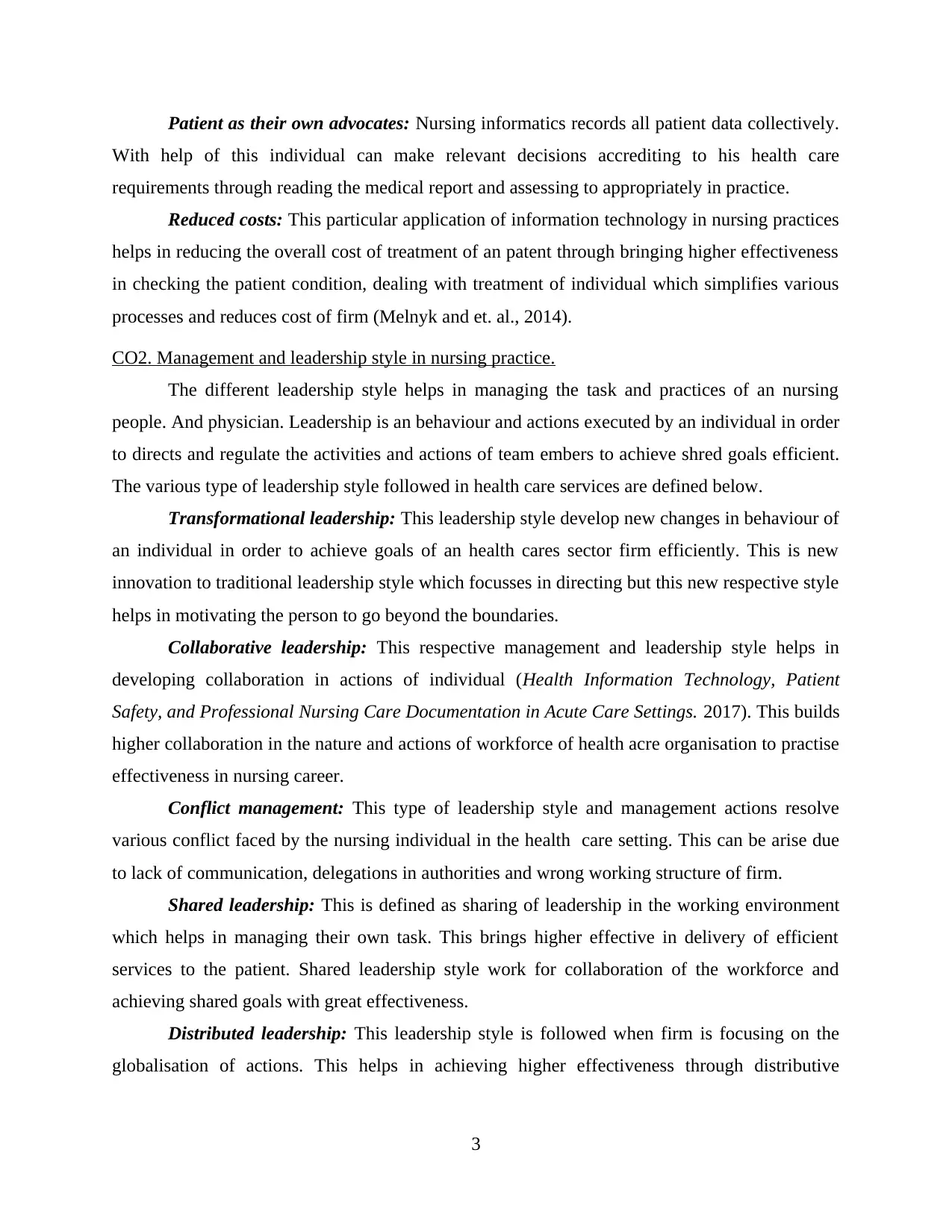
Patient as their own advocates: Nursing informatics records all patient data collectively.
With help of this individual can make relevant decisions accrediting to his health care
requirements through reading the medical report and assessing to appropriately in practice.
Reduced costs: This particular application of information technology in nursing practices
helps in reducing the overall cost of treatment of an patent through bringing higher effectiveness
in checking the patient condition, dealing with treatment of individual which simplifies various
processes and reduces cost of firm (Melnyk and et. al., 2014).
CO2. Management and leadership style in nursing practice.
The different leadership style helps in managing the task and practices of an nursing
people. And physician. Leadership is an behaviour and actions executed by an individual in order
to directs and regulate the activities and actions of team embers to achieve shred goals efficient.
The various type of leadership style followed in health care services are defined below.
Transformational leadership: This leadership style develop new changes in behaviour of
an individual in order to achieve goals of an health cares sector firm efficiently. This is new
innovation to traditional leadership style which focusses in directing but this new respective style
helps in motivating the person to go beyond the boundaries.
Collaborative leadership: This respective management and leadership style helps in
developing collaboration in actions of individual (Health Information Technology, Patient
Safety, and Professional Nursing Care Documentation in Acute Care Settings. 2017). This builds
higher collaboration in the nature and actions of workforce of health acre organisation to practise
effectiveness in nursing career.
Conflict management: This type of leadership style and management actions resolve
various conflict faced by the nursing individual in the health care setting. This can be arise due
to lack of communication, delegations in authorities and wrong working structure of firm.
Shared leadership: This is defined as sharing of leadership in the working environment
which helps in managing their own task. This brings higher effective in delivery of efficient
services to the patient. Shared leadership style work for collaboration of the workforce and
achieving shared goals with great effectiveness.
Distributed leadership: This leadership style is followed when firm is focusing on the
globalisation of actions. This helps in achieving higher effectiveness through distributive
3
With help of this individual can make relevant decisions accrediting to his health care
requirements through reading the medical report and assessing to appropriately in practice.
Reduced costs: This particular application of information technology in nursing practices
helps in reducing the overall cost of treatment of an patent through bringing higher effectiveness
in checking the patient condition, dealing with treatment of individual which simplifies various
processes and reduces cost of firm (Melnyk and et. al., 2014).
CO2. Management and leadership style in nursing practice.
The different leadership style helps in managing the task and practices of an nursing
people. And physician. Leadership is an behaviour and actions executed by an individual in order
to directs and regulate the activities and actions of team embers to achieve shred goals efficient.
The various type of leadership style followed in health care services are defined below.
Transformational leadership: This leadership style develop new changes in behaviour of
an individual in order to achieve goals of an health cares sector firm efficiently. This is new
innovation to traditional leadership style which focusses in directing but this new respective style
helps in motivating the person to go beyond the boundaries.
Collaborative leadership: This respective management and leadership style helps in
developing collaboration in actions of individual (Health Information Technology, Patient
Safety, and Professional Nursing Care Documentation in Acute Care Settings. 2017). This builds
higher collaboration in the nature and actions of workforce of health acre organisation to practise
effectiveness in nursing career.
Conflict management: This type of leadership style and management actions resolve
various conflict faced by the nursing individual in the health care setting. This can be arise due
to lack of communication, delegations in authorities and wrong working structure of firm.
Shared leadership: This is defined as sharing of leadership in the working environment
which helps in managing their own task. This brings higher effective in delivery of efficient
services to the patient. Shared leadership style work for collaboration of the workforce and
achieving shared goals with great effectiveness.
Distributed leadership: This leadership style is followed when firm is focusing on the
globalisation of actions. This helps in achieving higher effectiveness through distributive
3
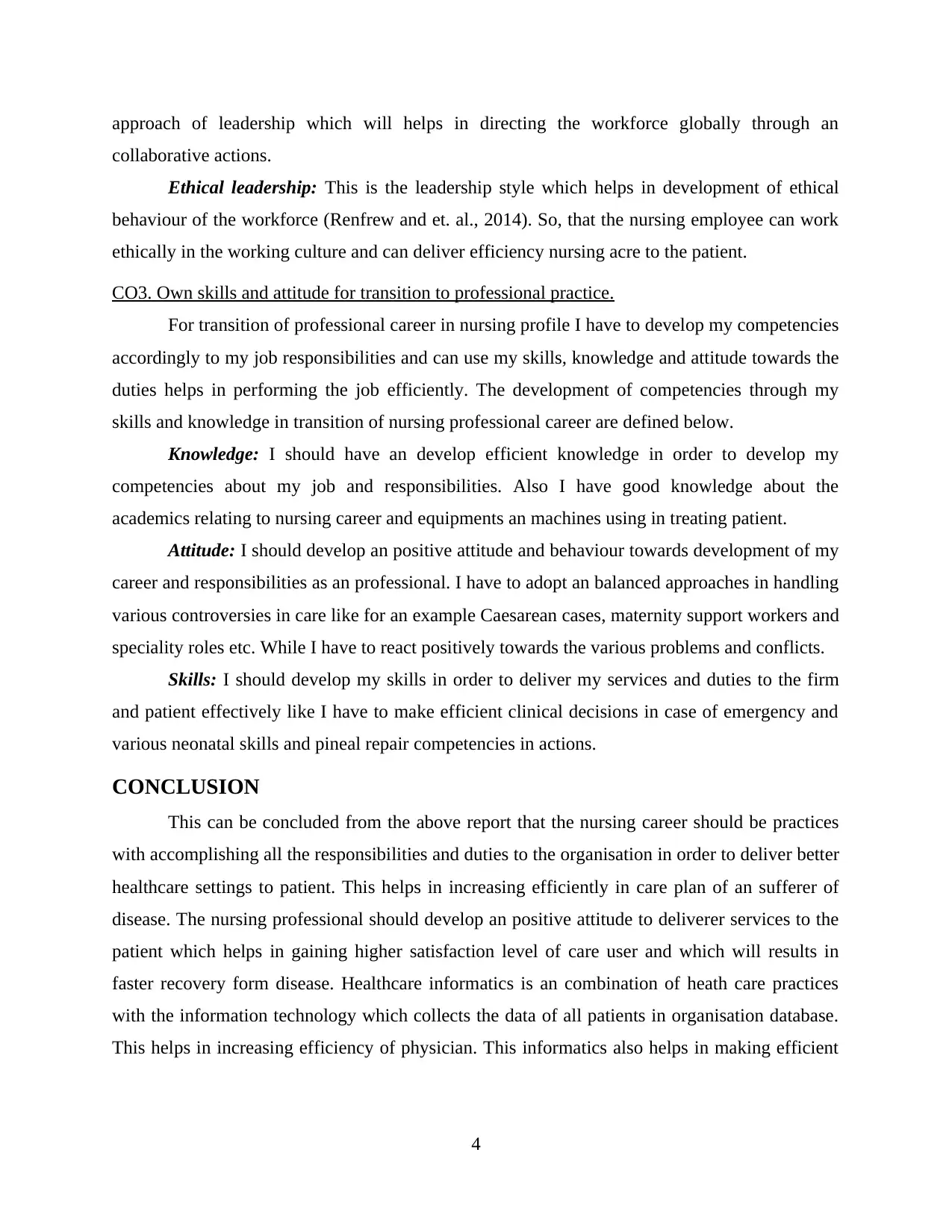
approach of leadership which will helps in directing the workforce globally through an
collaborative actions.
Ethical leadership: This is the leadership style which helps in development of ethical
behaviour of the workforce (Renfrew and et. al., 2014). So, that the nursing employee can work
ethically in the working culture and can deliver efficiency nursing acre to the patient.
CO3. Own skills and attitude for transition to professional practice.
For transition of professional career in nursing profile I have to develop my competencies
accordingly to my job responsibilities and can use my skills, knowledge and attitude towards the
duties helps in performing the job efficiently. The development of competencies through my
skills and knowledge in transition of nursing professional career are defined below.
Knowledge: I should have an develop efficient knowledge in order to develop my
competencies about my job and responsibilities. Also I have good knowledge about the
academics relating to nursing career and equipments an machines using in treating patient.
Attitude: I should develop an positive attitude and behaviour towards development of my
career and responsibilities as an professional. I have to adopt an balanced approaches in handling
various controversies in care like for an example Caesarean cases, maternity support workers and
speciality roles etc. While I have to react positively towards the various problems and conflicts.
Skills: I should develop my skills in order to deliver my services and duties to the firm
and patient effectively like I have to make efficient clinical decisions in case of emergency and
various neonatal skills and pineal repair competencies in actions.
CONCLUSION
This can be concluded from the above report that the nursing career should be practices
with accomplishing all the responsibilities and duties to the organisation in order to deliver better
healthcare settings to patient. This helps in increasing efficiently in care plan of an sufferer of
disease. The nursing professional should develop an positive attitude to deliverer services to the
patient which helps in gaining higher satisfaction level of care user and which will results in
faster recovery form disease. Healthcare informatics is an combination of heath care practices
with the information technology which collects the data of all patients in organisation database.
This helps in increasing efficiency of physician. This informatics also helps in making efficient
4
collaborative actions.
Ethical leadership: This is the leadership style which helps in development of ethical
behaviour of the workforce (Renfrew and et. al., 2014). So, that the nursing employee can work
ethically in the working culture and can deliver efficiency nursing acre to the patient.
CO3. Own skills and attitude for transition to professional practice.
For transition of professional career in nursing profile I have to develop my competencies
accordingly to my job responsibilities and can use my skills, knowledge and attitude towards the
duties helps in performing the job efficiently. The development of competencies through my
skills and knowledge in transition of nursing professional career are defined below.
Knowledge: I should have an develop efficient knowledge in order to develop my
competencies about my job and responsibilities. Also I have good knowledge about the
academics relating to nursing career and equipments an machines using in treating patient.
Attitude: I should develop an positive attitude and behaviour towards development of my
career and responsibilities as an professional. I have to adopt an balanced approaches in handling
various controversies in care like for an example Caesarean cases, maternity support workers and
speciality roles etc. While I have to react positively towards the various problems and conflicts.
Skills: I should develop my skills in order to deliver my services and duties to the firm
and patient effectively like I have to make efficient clinical decisions in case of emergency and
various neonatal skills and pineal repair competencies in actions.
CONCLUSION
This can be concluded from the above report that the nursing career should be practices
with accomplishing all the responsibilities and duties to the organisation in order to deliver better
healthcare settings to patient. This helps in increasing efficiently in care plan of an sufferer of
disease. The nursing professional should develop an positive attitude to deliverer services to the
patient which helps in gaining higher satisfaction level of care user and which will results in
faster recovery form disease. Healthcare informatics is an combination of heath care practices
with the information technology which collects the data of all patients in organisation database.
This helps in increasing efficiency of physician. This informatics also helps in making efficient
4
⊘ This is a preview!⊘
Do you want full access?
Subscribe today to unlock all pages.

Trusted by 1+ million students worldwide
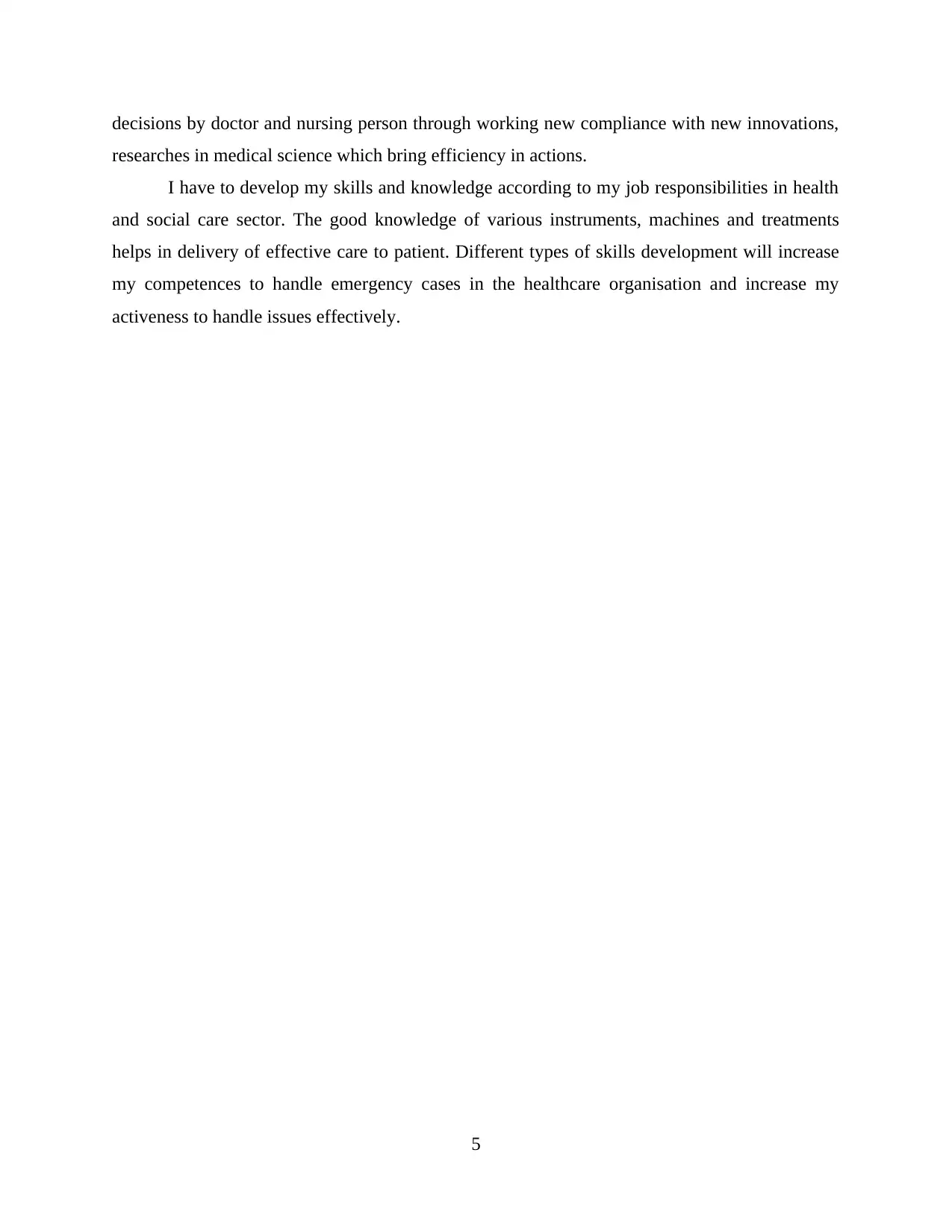
decisions by doctor and nursing person through working new compliance with new innovations,
researches in medical science which bring efficiency in actions.
I have to develop my skills and knowledge according to my job responsibilities in health
and social care sector. The good knowledge of various instruments, machines and treatments
helps in delivery of effective care to patient. Different types of skills development will increase
my competences to handle emergency cases in the healthcare organisation and increase my
activeness to handle issues effectively.
5
researches in medical science which bring efficiency in actions.
I have to develop my skills and knowledge according to my job responsibilities in health
and social care sector. The good knowledge of various instruments, machines and treatments
helps in delivery of effective care to patient. Different types of skills development will increase
my competences to handle emergency cases in the healthcare organisation and increase my
activeness to handle issues effectively.
5
Paraphrase This Document
Need a fresh take? Get an instant paraphrase of this document with our AI Paraphraser
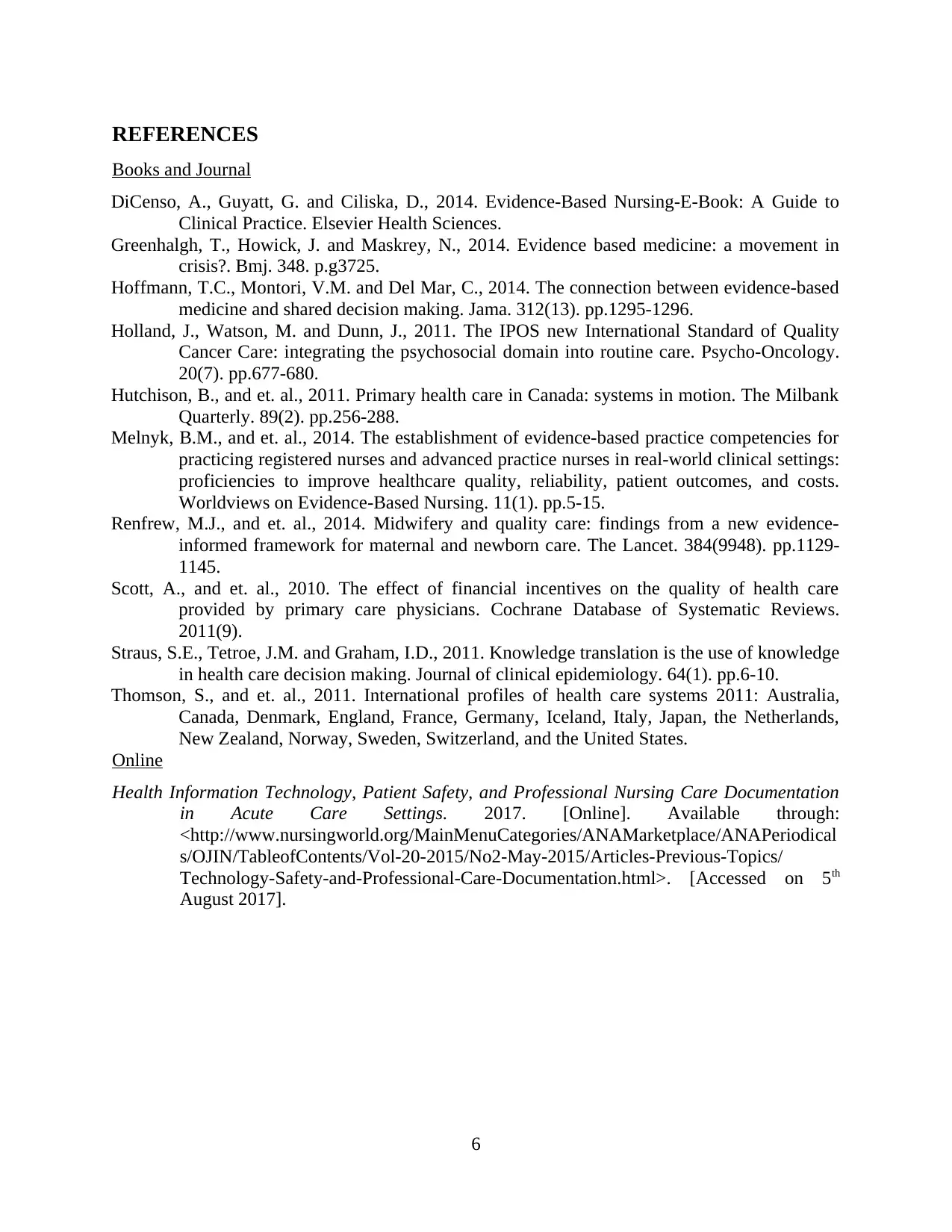
REFERENCES
Books and Journal
DiCenso, A., Guyatt, G. and Ciliska, D., 2014. Evidence-Based Nursing-E-Book: A Guide to
Clinical Practice. Elsevier Health Sciences.
Greenhalgh, T., Howick, J. and Maskrey, N., 2014. Evidence based medicine: a movement in
crisis?. Bmj. 348. p.g3725.
Hoffmann, T.C., Montori, V.M. and Del Mar, C., 2014. The connection between evidence-based
medicine and shared decision making. Jama. 312(13). pp.1295-1296.
Holland, J., Watson, M. and Dunn, J., 2011. The IPOS new International Standard of Quality
Cancer Care: integrating the psychosocial domain into routine care. Psycho‐Oncology.
20(7). pp.677-680.
Hutchison, B., and et. al., 2011. Primary health care in Canada: systems in motion. The Milbank
Quarterly. 89(2). pp.256-288.
Melnyk, B.M., and et. al., 2014. The establishment of evidence‐based practice competencies for
practicing registered nurses and advanced practice nurses in real‐world clinical settings:
proficiencies to improve healthcare quality, reliability, patient outcomes, and costs.
Worldviews on Evidence‐Based Nursing. 11(1). pp.5-15.
Renfrew, M.J., and et. al., 2014. Midwifery and quality care: findings from a new evidence-
informed framework for maternal and newborn care. The Lancet. 384(9948). pp.1129-
1145.
Scott, A., and et. al., 2010. The effect of financial incentives on the quality of health care
provided by primary care physicians. Cochrane Database of Systematic Reviews.
2011(9).
Straus, S.E., Tetroe, J.M. and Graham, I.D., 2011. Knowledge translation is the use of knowledge
in health care decision making. Journal of clinical epidemiology. 64(1). pp.6-10.
Thomson, S., and et. al., 2011. International profiles of health care systems 2011: Australia,
Canada, Denmark, England, France, Germany, Iceland, Italy, Japan, the Netherlands,
New Zealand, Norway, Sweden, Switzerland, and the United States.
Online
Health Information Technology, Patient Safety, and Professional Nursing Care Documentation
in Acute Care Settings. 2017. [Online]. Available through:
<http://www.nursingworld.org/MainMenuCategories/ANAMarketplace/ANAPeriodical
s/OJIN/TableofContents/Vol-20-2015/No2-May-2015/Articles-Previous-Topics/
Technology-Safety-and-Professional-Care-Documentation.html>. [Accessed on 5th
August 2017].
6
Books and Journal
DiCenso, A., Guyatt, G. and Ciliska, D., 2014. Evidence-Based Nursing-E-Book: A Guide to
Clinical Practice. Elsevier Health Sciences.
Greenhalgh, T., Howick, J. and Maskrey, N., 2014. Evidence based medicine: a movement in
crisis?. Bmj. 348. p.g3725.
Hoffmann, T.C., Montori, V.M. and Del Mar, C., 2014. The connection between evidence-based
medicine and shared decision making. Jama. 312(13). pp.1295-1296.
Holland, J., Watson, M. and Dunn, J., 2011. The IPOS new International Standard of Quality
Cancer Care: integrating the psychosocial domain into routine care. Psycho‐Oncology.
20(7). pp.677-680.
Hutchison, B., and et. al., 2011. Primary health care in Canada: systems in motion. The Milbank
Quarterly. 89(2). pp.256-288.
Melnyk, B.M., and et. al., 2014. The establishment of evidence‐based practice competencies for
practicing registered nurses and advanced practice nurses in real‐world clinical settings:
proficiencies to improve healthcare quality, reliability, patient outcomes, and costs.
Worldviews on Evidence‐Based Nursing. 11(1). pp.5-15.
Renfrew, M.J., and et. al., 2014. Midwifery and quality care: findings from a new evidence-
informed framework for maternal and newborn care. The Lancet. 384(9948). pp.1129-
1145.
Scott, A., and et. al., 2010. The effect of financial incentives on the quality of health care
provided by primary care physicians. Cochrane Database of Systematic Reviews.
2011(9).
Straus, S.E., Tetroe, J.M. and Graham, I.D., 2011. Knowledge translation is the use of knowledge
in health care decision making. Journal of clinical epidemiology. 64(1). pp.6-10.
Thomson, S., and et. al., 2011. International profiles of health care systems 2011: Australia,
Canada, Denmark, England, France, Germany, Iceland, Italy, Japan, the Netherlands,
New Zealand, Norway, Sweden, Switzerland, and the United States.
Online
Health Information Technology, Patient Safety, and Professional Nursing Care Documentation
in Acute Care Settings. 2017. [Online]. Available through:
<http://www.nursingworld.org/MainMenuCategories/ANAMarketplace/ANAPeriodical
s/OJIN/TableofContents/Vol-20-2015/No2-May-2015/Articles-Previous-Topics/
Technology-Safety-and-Professional-Care-Documentation.html>. [Accessed on 5th
August 2017].
6
1 out of 8
Related Documents
Your All-in-One AI-Powered Toolkit for Academic Success.
+13062052269
info@desklib.com
Available 24*7 on WhatsApp / Email
![[object Object]](/_next/static/media/star-bottom.7253800d.svg)
Unlock your academic potential
Copyright © 2020–2025 A2Z Services. All Rights Reserved. Developed and managed by ZUCOL.





